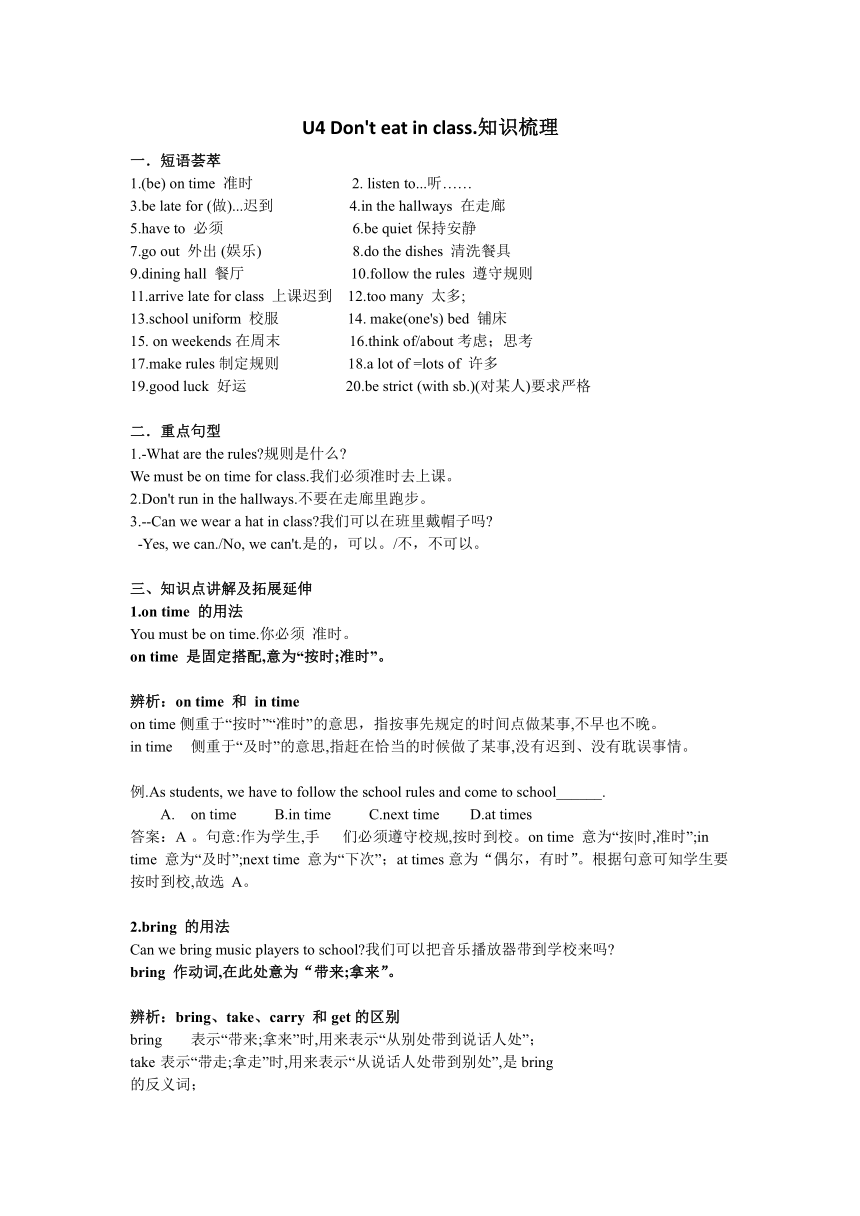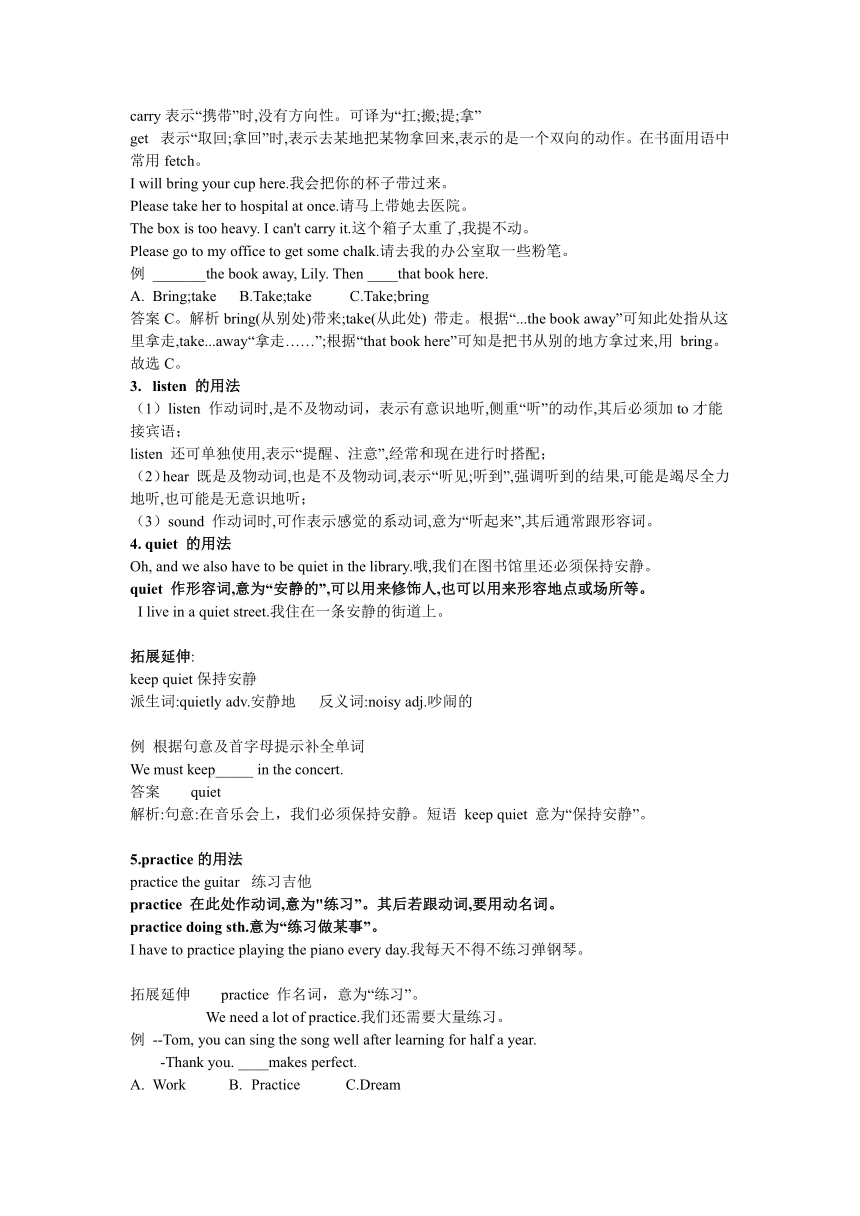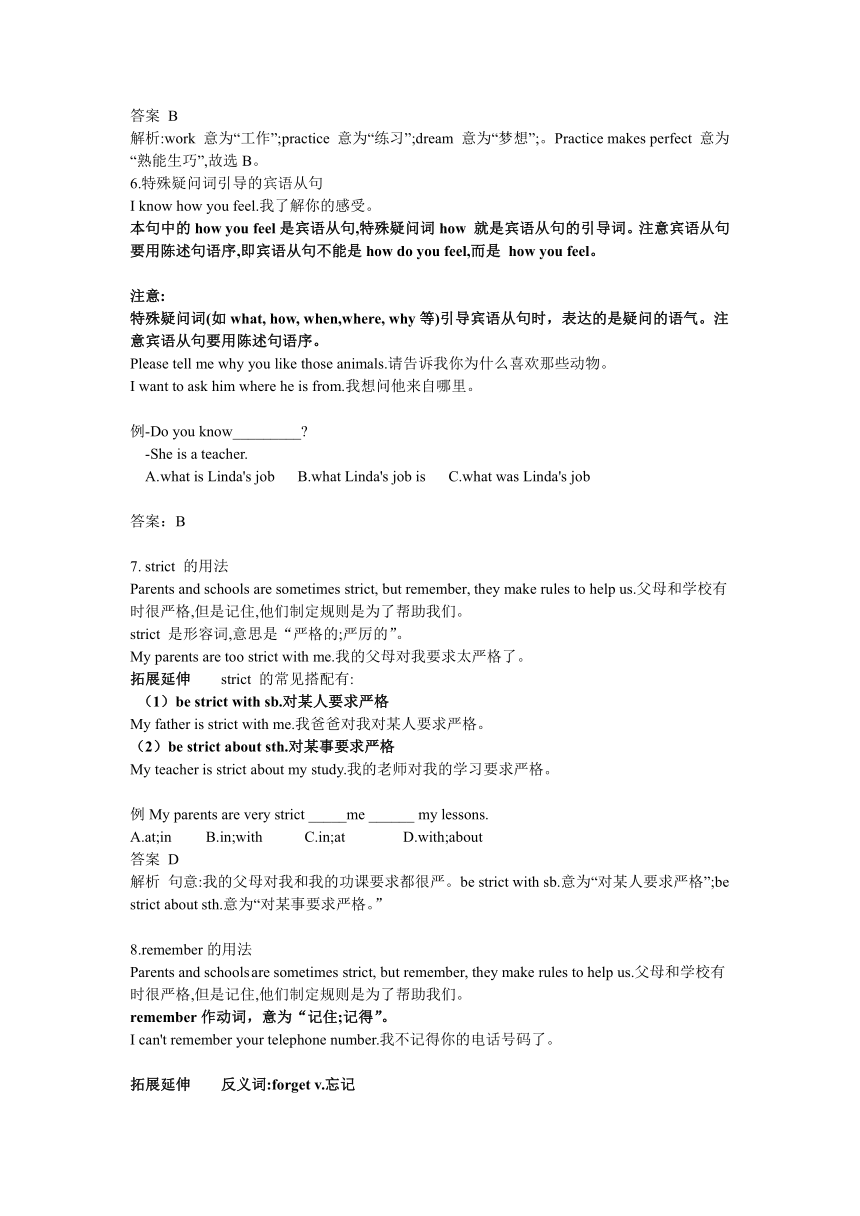2023-2024学年人教版英语七年级下册 Unit4 Don't eat in class.知识梳理 (无答案)
文档属性
| 名称 | 2023-2024学年人教版英语七年级下册 Unit4 Don't eat in class.知识梳理 (无答案) |

|
|
| 格式 | docx | ||
| 文件大小 | 29.2KB | ||
| 资源类型 | 教案 | ||
| 版本资源 | 人教新目标(Go for it)版 | ||
| 科目 | 英语 | ||
| 更新时间 | 2024-02-19 16:02:59 | ||
图片预览



文档简介
U4 Don't eat in class.知识梳理
短语荟萃
1.(be) on time 准时 2. listen to...听……
3.be late for (做)...迟到 4.in the hallways 在走廊
5.have to 必须 6.be quiet保持安静
7.go out 外出 (娱乐) 8.do the dishes 清洗餐具
9.dining hall 餐厅 10.follow the rules 遵守规则
11.arrive late for class 上课迟到 12.too many 太多;
13.school uniform 校服 14. make(one's) bed 铺床
15. on weekends在周末 16.think of/about考虑;思考
17.make rules制定规则 18.a lot of =lots of 许多
19.good luck 好运 20.be strict (with sb.)(对某人)要求严格
重点句型
1.-What are the rules 规则是什么
We must be on time for class.我们必须准时去上课。
2.Don't run in the hallways.不要在走廊里跑步。
3.--Can we wear a hat in class 我们可以在班里戴帽子吗
-Yes, we can./No, we can't.是的,可以。/不,不可以。
知识点讲解及拓展延伸
1.on time 的用法
You must be on time.你必须 准时。
on time 是固定搭配,意为“按时;准时”。
辨析:on time 和 in time
on time侧重于“按时”“准时”的意思,指按事先规定的时间点做某事,不早也不晚。
in time 侧重于“及时”的意思,指赶在恰当的时候做了某事,没有迟到、没有耽误事情。
例.As students, we have to follow the school rules and come to school______.
on time B.in time C.next time D.at times
答案:A 。句意:作为学生,手 们必须遵守校规,按时到校。on time 意为“按|时,准时”;in time 意为“及时”;next time 意为“下次”;at times意为“偶尔,有时”。根据句意可知学生要按时到校,故选 A。
2.bring 的用法
Can we bring music players to school 我们可以把音乐播放器带到学校来吗
bring 作动词,在此处意为“带来;拿来”。
辨析:bring、take、carry 和get的区别
bring 表示“带来;拿来”时,用来表示“从别处带到说话人处”;
take 表示“带走;拿走”时,用来表示“从说话人处带到别处”,是bring
的反义词;
carry表示“携带”时,没有方向性。可译为“扛;搬;提;拿”
get 表示“取回;拿回”时,表示去某地把某物拿回来,表示的是一个双向的动作。在书面用语中常用fetch。
I will bring your cup here.我会把你的杯子带过来。
Please take her to hospital at once.请马上带她去医院。
The box is too heavy. I can't carry it.这个箱子太重了,我提不动。
Please go to my office to get some chalk.请去我的办公室取一些粉笔。
例 _______the book away, Lily. Then ____that book here.
Bring;take B.Take;take C.Take;bring
答案C。解析bring(从别处)带来;take(从此处) 带走。根据“...the book away”可知此处指从这里拿走,take...away“拿走……”;根据“that book here”可知是把书从别的地方拿过来,用 bring。故选C。
listen 的用法
(1)listen 作动词时,是不及物动词,表示有意识地听,侧重“听”的动作,其后必须加to才能接宾语;
listen 还可单独使用,表示“提醒、注意”,经常和现在进行时搭配;
(2)hear 既是及物动词,也是不及物动词,表示“听见;听到”,强调听到的结果,可能是竭尽全力地听,也可能是无意识地听;
(3)sound 作动词时,可作表示感觉的系动词,意为“听起来”,其后通常跟形容词。
4. quiet 的用法
Oh, and we also have to be quiet in the library.哦,我们在图书馆里还必须保持安静。
quiet 作形容词,意为“安静的”,可以用来修饰人,也可以用来形容地点或场所等。
I live in a quiet street.我住在一条安静的街道上。
拓展延伸:
keep quiet保持安静
派生词:quietly adv.安静地 反义词:noisy adj.吵闹的
例 根据句意及首字母提示补全单词
We must keep_____ in the concert.
答案 quiet
解析:句意:在音乐会上,我们必须保持安静。短语 keep quiet 意为“保持安静”。
5.practice的用法
practice the guitar 练习吉他
practice 在此处作动词,意为"练习”。其后若跟动词,要用动名词。
practice doing sth.意为“练习做某事”。
I have to practice playing the piano every day.我每天不得不练习弹钢琴。
拓展延伸 practice 作名词,意为“练习”。
We need a lot of practice.我们还需要大量练习。
例 --Tom, you can sing the song well after learning for half a year.
-Thank you. ____makes perfect.
Work B. Practice C.Dream
答案 B
解析:work 意为“工作”;practice 意为“练习”;dream 意为“梦想”;。Practice makes perfect 意为“熟能生巧”,故选B。
6.特殊疑问词引导的宾语从句
I know how you feel.我了解你的感受。
本句中的how you feel是宾语从句,特殊疑问词how 就是宾语从句的引导词。注意宾语从句要用陈述句语序,即宾语从句不能是how do you feel,而是 how you feel。
注意:
特殊疑问词(如what, how, when,where, why等)引导宾语从句时,表达的是疑问的语气。注意宾语从句要用陈述句语序。
Please tell me why you like those animals.请告诉我你为什么喜欢那些动物。
I want to ask him where he is from.我想问他来自哪里。
例-Do you know_________
-She is a teacher.
what is Linda's job B.what Linda's job is C.what was Linda's job
答案:B
7. strict 的用法
Parents and schools are sometimes strict, but remember, they make rules to help us.父母和学校有时很严格,但是记住,他们制定规则是为了帮助我们。
strict 是形容词,意思是“严格的;严厉的”。
My parents are too strict with me.我的父母对我要求太严格了。
拓展延伸 strict 的常见搭配有:
(1)be strict with sb.对某人要求严格
My father is strict with me.我爸爸对我对某人要求严格。
be strict about sth.对某事要求严格
My teacher is strict about my study.我的老师对我的学习要求严格。
例My parents are very strict _____me ______ my lessons.
A.at;in B.in;with C.in;at D.with;about
答案 D
解析 句意:我的父母对我和我的功课要求都很严。be strict with sb.意为“对某人要求严格”;be strict about sth.意为“对某事要求严格。”
8.remember的用法
Parents and schools are sometimes strict, but remember, they make rules to help us.父母和学校有时很严格,但是记住,他们制定规则是为了帮助我们。
remember作动词,意为“记住;记得”。
I can't remember your telephone number.我不记得你的电话号码了。
拓展延伸 反义词:forget v.忘记
I forget the date and time of the meeting. Can you tell me 我忘记了会议的日期和时间。你能告诉我吗
辨析remember to do sth.和remember doing sth.
remember to do sth.表示“记得应该做而还没有做的事情”。
Remember to call me back.记得给我回电话。
Remember doing sth.表示“记得曾经做过的事情”。
I remember putting my bag on the table.我记得把我的包放在桌子上了。
例 根据句子意思及所给的中文提示完成单词,每空只能填一词
My mother always_______(记得)to remind me to drink milk for breakfast.
答案 remembers
9. good luck 的口语表达
Good luck!祝你好运!
该句是常见的口语表达,用于祝对方好运。当得知某人要去参加比赛或面试等时,要用“Good luck!”祝对方好运。
-I'm going to enter the singing competition.我打算参加歌唱比赛。
-Good luck!祝你好运!
拓展延伸 luck 作名词时,意为“幸运;运气”。
good luck 好运
bad luck霉运
luck幸运的 lucky adj. luckily adv.
派生词: 幸运地 unlucky adj.不幸的
unluckily adv.不幸地
例I will have a English test tomorrow.
-_________!
Good luck B.It's good exercise C.The same to you D.Well done
答案 A
10.辨析too many, too much, much too
too many意为“太多”,中心词是many,其后要跟可数名词的 复数形式;
too much意为“太多”,中心词是much,其后要跟不可数名词;
much too意为“太……”,用来修饰形容词或副词。
语法重点
1.祈使句
祈使句是用来表示命令、要求、请求或劝告的句子。祈使句的主语通常是第二人称,通常省略主语。祈使句有肯定和否定两种结构。
(1)肯定结构的祈使句
Do 型 动词原形(+宾语)+其他.
Be型 Be+表语(名词或形容词)+其他.
Let 型 Let+宾语+动词原形+其他.
Please have a seat here.请这边坐。
Be a good boy!要做一个好孩子!
Let me help you.让我来帮助你吧。
(2)否定结构的祈使句
Don't+动词原形/be动词
以 Don't 开头+其他.
以 No开头 No+名词/动名词.
Don't fight with your brother.不要和你弟弟打架。
Don't be late for school!上学不要迟到!
No smoking/photos! 禁止吸烟/拍照!
2、情态动词
本单元学到的情态动词涉及如下三类:
can “可以”,表示许可,表示“必须”,强调主观上意识到必须做某事;
mustn't表示“不准,不许”,表示语气较为强烈的禁止;
have to表示“不得不;必须”,含有“被迫;强迫”之意,变疑问句或否定句时要借助助动词do。
Can we eat in the classroom 我们可以在教室里吃东西吗
You must obey the rules.你们必须遵守这些规定。
You mustn't touch anything.你们不许摸任何东西。
We have to wear school uniforms on Mondays.我们周一必须穿校服。
-Do you have to stay at home today今天你不得不待在家里吗
-Yes,I do.是的,我不得不待在家里。
课后练习
单项选择
1._____the room first,and then you can watch TV.
A.Clean B.To clean C.Cleans D.Cleaning
2.Please ____your room clean, or your mother will be unhappy.
-Oh, I know. Thank you.
A.want B.learn C.keep D.bring
3.Please listen ____ the teacher carefully.
A.to B.on C.at D.in
4. ______ silent, please! You are in the library.
--- I'm sorry, madam.
A.Keep B.To keep C.Keeping D.Kept
5.Jim practices ________ basketball hard. I think he wants to be a basketball player.
A.to play B.plays C.playing D.play
6.My brother's bike doesn't work, so he _____walk to school.
A.must B.need to C.have to D.has to
7.-Can you ______the village tomorrow with your cousin
-Yes, we can get there in the afternoon.
A.get B.arrive in C.arrive at D.reach to
8.Can we _____mobile phones to school
-No, we can't. We must listen to the teacher _____in class.
A.takes;carefully B.bring;carefully C.borrow;careful D.fetch;careful
9.Our teacher is very strict ____us and she is also strict______our homework.
A.in; with B.with;about C.with;to D.to;at
10. There are_____people on the bus. I have _____work to do.
A.too many;too many B.too much;too many
C.too much; too much D.too many;too much
短语荟萃
1.(be) on time 准时 2. listen to...听……
3.be late for (做)...迟到 4.in the hallways 在走廊
5.have to 必须 6.be quiet保持安静
7.go out 外出 (娱乐) 8.do the dishes 清洗餐具
9.dining hall 餐厅 10.follow the rules 遵守规则
11.arrive late for class 上课迟到 12.too many 太多;
13.school uniform 校服 14. make(one's) bed 铺床
15. on weekends在周末 16.think of/about考虑;思考
17.make rules制定规则 18.a lot of =lots of 许多
19.good luck 好运 20.be strict (with sb.)(对某人)要求严格
重点句型
1.-What are the rules 规则是什么
We must be on time for class.我们必须准时去上课。
2.Don't run in the hallways.不要在走廊里跑步。
3.--Can we wear a hat in class 我们可以在班里戴帽子吗
-Yes, we can./No, we can't.是的,可以。/不,不可以。
知识点讲解及拓展延伸
1.on time 的用法
You must be on time.你必须 准时。
on time 是固定搭配,意为“按时;准时”。
辨析:on time 和 in time
on time侧重于“按时”“准时”的意思,指按事先规定的时间点做某事,不早也不晚。
in time 侧重于“及时”的意思,指赶在恰当的时候做了某事,没有迟到、没有耽误事情。
例.As students, we have to follow the school rules and come to school______.
on time B.in time C.next time D.at times
答案:A 。句意:作为学生,手 们必须遵守校规,按时到校。on time 意为“按|时,准时”;in time 意为“及时”;next time 意为“下次”;at times意为“偶尔,有时”。根据句意可知学生要按时到校,故选 A。
2.bring 的用法
Can we bring music players to school 我们可以把音乐播放器带到学校来吗
bring 作动词,在此处意为“带来;拿来”。
辨析:bring、take、carry 和get的区别
bring 表示“带来;拿来”时,用来表示“从别处带到说话人处”;
take 表示“带走;拿走”时,用来表示“从说话人处带到别处”,是bring
的反义词;
carry表示“携带”时,没有方向性。可译为“扛;搬;提;拿”
get 表示“取回;拿回”时,表示去某地把某物拿回来,表示的是一个双向的动作。在书面用语中常用fetch。
I will bring your cup here.我会把你的杯子带过来。
Please take her to hospital at once.请马上带她去医院。
The box is too heavy. I can't carry it.这个箱子太重了,我提不动。
Please go to my office to get some chalk.请去我的办公室取一些粉笔。
例 _______the book away, Lily. Then ____that book here.
Bring;take B.Take;take C.Take;bring
答案C。解析bring(从别处)带来;take(从此处) 带走。根据“...the book away”可知此处指从这里拿走,take...away“拿走……”;根据“that book here”可知是把书从别的地方拿过来,用 bring。故选C。
listen 的用法
(1)listen 作动词时,是不及物动词,表示有意识地听,侧重“听”的动作,其后必须加to才能接宾语;
listen 还可单独使用,表示“提醒、注意”,经常和现在进行时搭配;
(2)hear 既是及物动词,也是不及物动词,表示“听见;听到”,强调听到的结果,可能是竭尽全力地听,也可能是无意识地听;
(3)sound 作动词时,可作表示感觉的系动词,意为“听起来”,其后通常跟形容词。
4. quiet 的用法
Oh, and we also have to be quiet in the library.哦,我们在图书馆里还必须保持安静。
quiet 作形容词,意为“安静的”,可以用来修饰人,也可以用来形容地点或场所等。
I live in a quiet street.我住在一条安静的街道上。
拓展延伸:
keep quiet保持安静
派生词:quietly adv.安静地 反义词:noisy adj.吵闹的
例 根据句意及首字母提示补全单词
We must keep_____ in the concert.
答案 quiet
解析:句意:在音乐会上,我们必须保持安静。短语 keep quiet 意为“保持安静”。
5.practice的用法
practice the guitar 练习吉他
practice 在此处作动词,意为"练习”。其后若跟动词,要用动名词。
practice doing sth.意为“练习做某事”。
I have to practice playing the piano every day.我每天不得不练习弹钢琴。
拓展延伸 practice 作名词,意为“练习”。
We need a lot of practice.我们还需要大量练习。
例 --Tom, you can sing the song well after learning for half a year.
-Thank you. ____makes perfect.
Work B. Practice C.Dream
答案 B
解析:work 意为“工作”;practice 意为“练习”;dream 意为“梦想”;。Practice makes perfect 意为“熟能生巧”,故选B。
6.特殊疑问词引导的宾语从句
I know how you feel.我了解你的感受。
本句中的how you feel是宾语从句,特殊疑问词how 就是宾语从句的引导词。注意宾语从句要用陈述句语序,即宾语从句不能是how do you feel,而是 how you feel。
注意:
特殊疑问词(如what, how, when,where, why等)引导宾语从句时,表达的是疑问的语气。注意宾语从句要用陈述句语序。
Please tell me why you like those animals.请告诉我你为什么喜欢那些动物。
I want to ask him where he is from.我想问他来自哪里。
例-Do you know_________
-She is a teacher.
what is Linda's job B.what Linda's job is C.what was Linda's job
答案:B
7. strict 的用法
Parents and schools are sometimes strict, but remember, they make rules to help us.父母和学校有时很严格,但是记住,他们制定规则是为了帮助我们。
strict 是形容词,意思是“严格的;严厉的”。
My parents are too strict with me.我的父母对我要求太严格了。
拓展延伸 strict 的常见搭配有:
(1)be strict with sb.对某人要求严格
My father is strict with me.我爸爸对我对某人要求严格。
be strict about sth.对某事要求严格
My teacher is strict about my study.我的老师对我的学习要求严格。
例My parents are very strict _____me ______ my lessons.
A.at;in B.in;with C.in;at D.with;about
答案 D
解析 句意:我的父母对我和我的功课要求都很严。be strict with sb.意为“对某人要求严格”;be strict about sth.意为“对某事要求严格。”
8.remember的用法
Parents and schools are sometimes strict, but remember, they make rules to help us.父母和学校有时很严格,但是记住,他们制定规则是为了帮助我们。
remember作动词,意为“记住;记得”。
I can't remember your telephone number.我不记得你的电话号码了。
拓展延伸 反义词:forget v.忘记
I forget the date and time of the meeting. Can you tell me 我忘记了会议的日期和时间。你能告诉我吗
辨析remember to do sth.和remember doing sth.
remember to do sth.表示“记得应该做而还没有做的事情”。
Remember to call me back.记得给我回电话。
Remember doing sth.表示“记得曾经做过的事情”。
I remember putting my bag on the table.我记得把我的包放在桌子上了。
例 根据句子意思及所给的中文提示完成单词,每空只能填一词
My mother always_______(记得)to remind me to drink milk for breakfast.
答案 remembers
9. good luck 的口语表达
Good luck!祝你好运!
该句是常见的口语表达,用于祝对方好运。当得知某人要去参加比赛或面试等时,要用“Good luck!”祝对方好运。
-I'm going to enter the singing competition.我打算参加歌唱比赛。
-Good luck!祝你好运!
拓展延伸 luck 作名词时,意为“幸运;运气”。
good luck 好运
bad luck霉运
luck幸运的 lucky adj. luckily adv.
派生词: 幸运地 unlucky adj.不幸的
unluckily adv.不幸地
例I will have a English test tomorrow.
-_________!
Good luck B.It's good exercise C.The same to you D.Well done
答案 A
10.辨析too many, too much, much too
too many意为“太多”,中心词是many,其后要跟可数名词的 复数形式;
too much意为“太多”,中心词是much,其后要跟不可数名词;
much too意为“太……”,用来修饰形容词或副词。
语法重点
1.祈使句
祈使句是用来表示命令、要求、请求或劝告的句子。祈使句的主语通常是第二人称,通常省略主语。祈使句有肯定和否定两种结构。
(1)肯定结构的祈使句
Do 型 动词原形(+宾语)+其他.
Be型 Be+表语(名词或形容词)+其他.
Let 型 Let+宾语+动词原形+其他.
Please have a seat here.请这边坐。
Be a good boy!要做一个好孩子!
Let me help you.让我来帮助你吧。
(2)否定结构的祈使句
Don't+动词原形/be动词
以 Don't 开头+其他.
以 No开头 No+名词/动名词.
Don't fight with your brother.不要和你弟弟打架。
Don't be late for school!上学不要迟到!
No smoking/photos! 禁止吸烟/拍照!
2、情态动词
本单元学到的情态动词涉及如下三类:
can “可以”,表示许可,表示“必须”,强调主观上意识到必须做某事;
mustn't表示“不准,不许”,表示语气较为强烈的禁止;
have to表示“不得不;必须”,含有“被迫;强迫”之意,变疑问句或否定句时要借助助动词do。
Can we eat in the classroom 我们可以在教室里吃东西吗
You must obey the rules.你们必须遵守这些规定。
You mustn't touch anything.你们不许摸任何东西。
We have to wear school uniforms on Mondays.我们周一必须穿校服。
-Do you have to stay at home today今天你不得不待在家里吗
-Yes,I do.是的,我不得不待在家里。
课后练习
单项选择
1._____the room first,and then you can watch TV.
A.Clean B.To clean C.Cleans D.Cleaning
2.Please ____your room clean, or your mother will be unhappy.
-Oh, I know. Thank you.
A.want B.learn C.keep D.bring
3.Please listen ____ the teacher carefully.
A.to B.on C.at D.in
4. ______ silent, please! You are in the library.
--- I'm sorry, madam.
A.Keep B.To keep C.Keeping D.Kept
5.Jim practices ________ basketball hard. I think he wants to be a basketball player.
A.to play B.plays C.playing D.play
6.My brother's bike doesn't work, so he _____walk to school.
A.must B.need to C.have to D.has to
7.-Can you ______the village tomorrow with your cousin
-Yes, we can get there in the afternoon.
A.get B.arrive in C.arrive at D.reach to
8.Can we _____mobile phones to school
-No, we can't. We must listen to the teacher _____in class.
A.takes;carefully B.bring;carefully C.borrow;careful D.fetch;careful
9.Our teacher is very strict ____us and she is also strict______our homework.
A.in; with B.with;about C.with;to D.to;at
10. There are_____people on the bus. I have _____work to do.
A.too many;too many B.too much;too many
C.too much; too much D.too many;too much
同课章节目录
- Unit 1 Can you play the guitar?
- Section A
- Section B
- Unit 2 What time do you go to school?
- Section A
- Section B
- Unit 3 How do you get to school?
- Section A
- Section B
- Unit 4 Don't eat in class.
- Section A
- Section B
- Unit 5 Why do you like pandas?
- Section A
- Section B
- Unit 6 I'm watching TV.
- Section A
- Section B
- Review of Units 1-6
- Unit 7 It's raining!
- Section A
- Section B
- Unit 8 Is there a post office near here?
- Section A
- Section B
- Unit 9 What does he look like?
- Section A
- Section B
- Unit 10 I'd like some noodles.
- Section A
- Section B
- Unit 11 How was your school trip?
- Section A
- Section B
- Unit 12 What did you do last weekend?
- Section A
- Section B
